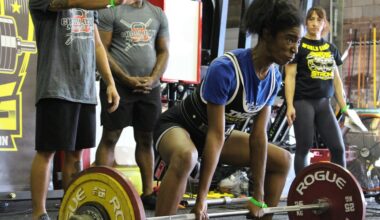Nutrition-Based Approaches to Managing Anxiety for Athletes
Nutrition plays a crucial role in enhancing the mind-body connection, particularly for athletes grappling with anxiety. The connection between physical well-being and mental health underscores the importance of dietary choices. Proper nutrition provides the body with essential nutrients that help manage stress and anxiety effectively. Consuming a balanced diet improves overall cognitive function and emotional stability. Athletes who focus on their diets may experience reduced levels of anxiety, which can enhance their performance. Nutrient-dense foods rich in vitamins and minerals have been shown to impact mood positively. In addition, omega-3 fatty acids, readily available in fish, nuts, and seeds, have anti-inflammatory properties that may alleviate anxiety. Hydration also plays a significant role; dehydration can negatively affect mood and cognitive performance. Therefore, staying hydrated through proper fluid intake is essential for athletes. Incorporating whole grains, lean proteins, fresh fruits, and vegetables provides a foundation for improved mental resilience. It’s essential for athletes to recognize the immense power of nutrition in combating anxiety and enhancing their overall mental health.
Balanced meals are crucial for sustaining energy levels during training and competitions.
Key Nutritional Elements for Anxiety Management
Specific nutrients contribute to cortisol regulation, which directly influences how the body responds to stress. B vitamins, particularly B6, B12, and folate, play vital roles in neurotransmitter production. These vitamins are fundamental for synthesizing serotonin, often linked to stabilizing mood and reducing anxiety. Foods rich in these vitamins include leafy greens, legumes, and fortified cereals. Additionally, magnesium is essential for maintaining normal brain function and has been linked to reducing anxiety levels. Foods like nuts, seeds, whole grains, and dark chocolate are excellent sources of magnesium. Probiotics are also gaining attention for their role in gut health, which connects directly to mental well-being. Fermented foods like yogurt, kefir, and sauerkraut help maintain a healthy gut microbiome, potentially decreasing anxiety symptoms. Furthermore, antioxidants found in fruits and vegetables combat oxidative stress, which may exacerbate anxiety. Regularly including a variety of colorful produce in the diet ensures a wide range of nutrients for optimal brain function and emotional balance.
The Role of Meal Timing and Frequency
Meal timing and frequency can significantly impact mood and anxiety levels. Eating regular meals helps maintain steady blood sugar levels, crucial for mood stabilization. Athletes are encouraged to consume small, balanced meals or snacks throughout the day to prevent energy dips and sustain focus. By doing this, they can minimize anxiety spikes linked to hunger or energy deficits. Additionally, consuming meals rich in complex carbohydrates can promote serotonin production, enhancing feelings of well-being. Foods like brown rice, quinoa, and oats should be staples in an athlete’s diet for this reason. Eating before training or competitions can also help manage anxiety, ensuring adequate energy levels are available. However, it is essential to choose easily digestible options to avoid any discomfort during physical activity. Hydration at mealtimes is just as critical; sipping on water or electrolyte-rich drinks can ease dehydration, which may worsen anxiety symptoms. It’s worth noting that after strenuous activities, refueling with protein and healthy fats will aid recovery and help maintain stable emotions.
As athletes navigate their schedules, being mindful of food choices can lead to emotional resilience.
Supplements to Consider for Managing Anxiety
For athletes struggling with anxiety, dietary supplements may offer additional support. While whole foods should be prioritized, certain supplements can complement a healthy diet. Omega-3 fatty acid supplements are widely recognized for their ability to reduce anxiety symptoms. Studies indicate that they can help decrease feelings of stress and tension. Magnesium supplements may also provide benefits for athletes, as they support muscle function and relaxation, potentially alleviating anxiety. Vitamin D is another crucial nutrient; research suggests it plays a role in mood regulation. Therefore, maintaining adequate vitamin D levels through sunlight exposure or supplementation is vital. Additionally, adaptogenic herbs such as ashwagandha and rhodiola rosea have gained popularity for their potential anxiety-reducing effects. These herbs help the body adapt to stress and may enhance overall mental health. However, athletes should consult with a healthcare professional before starting any supplement regimen to ensure safety and effectiveness. Incorporating these supplements as part of a comprehensive nutritional strategy may further bolster athletes’ resilience against anxiety.
The Importance of Mindfulness in Nutrition
Practicing mindfulness in eating can also contribute to improved anxiety management for athletes. Mindful eating involves recognizing hunger cues, savoring meals, and focusing on the experience of eating. This approach can help athletes develop a healthier relationship with food, reducing stress around meal times. By paying attention to what they eat, athletes can enhance their overall enjoyment and satisfaction with meals, which can mitigate anxiety surrounding food choices and anxiety during competitions. Additionally, mindfulness techniques such as meditation and deep-breathing exercises can further support mental clarity and emotional control. When combined with a nutrient-rich diet, these practices can create a powerful synergy for managing anxiety. Athletes should consider dedicating time to these mindfulness practices before meals and throughout the day. The combination of eating nutritious foods and practicing mindfulness helps to create a supportive mental environment, allowing athletes to perform at their best under pressure. Building a healthy mindset is just as vital as physical training for achieving athletic success. This holistic approach can lead to lasting positive effects on overall mental health.
Understanding the interplay between nutrition and mental health is crucial for athletes.
Long-Term Benefits of Nutrition for Athletes
Focusing on nutrition not only aids in short-term anxiety management but also leads to long-term mental health benefits. Athletes who prioritize their nutritional intake can enhance cognitive function, emotional stability, and overall resilience to stressors. Over time, a nutrient-rich diet fosters better brain health, allowing athletes to remain calm and focused during high-pressure situations. Moreover, consistent nutritional habits can reduce the risk of burnout and exhaustion, common pitfalls faced by many athletes. These good practices enable athletes to maintain enthusiasm and motivation in their sports, significantly impacting performance levels positively. Developing healthy eating habits is a continuous process that requires commitment and mindfulness. Building a supportive network with nutritionists and coaches who understand the importance of mental wellness can enhance an athlete’s journey. Athletes should view nutrition as an integral part of their training regimen, making intentional choices that align with their goals. Cultivating a deeper understanding of nutrition empowers athletes with the tools to manage anxiety effectively, ensuring sustained athletic success alongside mental well-being.
Ultimately, adopting nutrition-based approaches is a transformative experience for athletes.
Conclusion: A Holistic Approach to Athletic Well-Being
Nutrition-based approaches to managing anxiety carve a path for holistic well-being among athletes. By addressing both the mind and body, athletes can unlock their full potential. Incorporating nutrient-dense foods, proper hydration, and mindful eating practices fosters a strong mental foundation necessary for optimal performance. Furthermore, incorporating supplements and mindfulness techniques enhances athletes’ resilience to stressors, promoting a proactive approach to mental health. Resulting in an improved overall sense of well-being, engaging with nutrition thoughtfully allows athletes to manage anxiety effectively, creating a harmonious relationship between physical performance and mental clarity. As the sports world increasingly acknowledges the mind-body connection, the focus on nutrition must remain paramount. Athletes must prioritize their diets and embrace practices that promote emotional and psychological resilience in addition to their physical training. Overall, bridging the gap between nutrition and mental health empowers athletes to thrive in their respective sports while cultivating a balanced lifestyle. The intersection of nutrition and the mind-body connection ultimately leads not only to enhanced performance but also to fulfilling, healthy athletic journeys.


